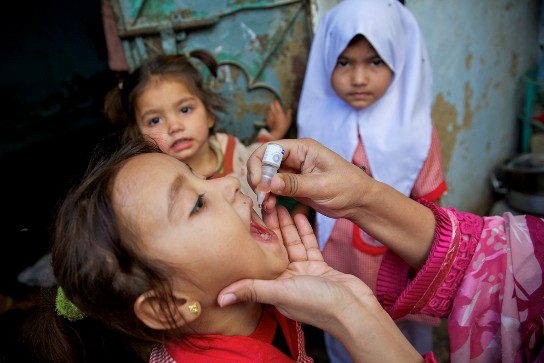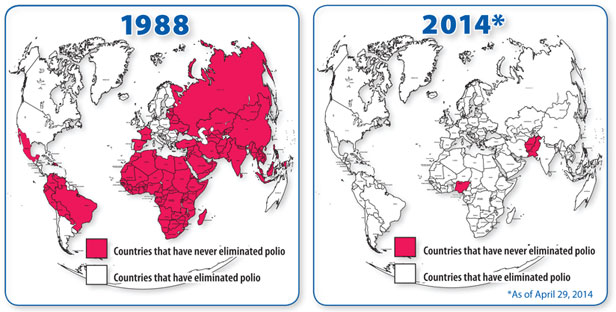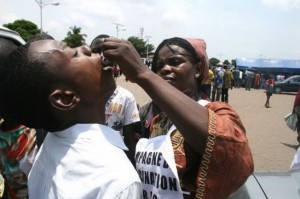
The Long Final Leap Against Polio in Pakistan
On February 23, 2015, in Quetta, Pakistan over 400 teams of healthcare workers began an eight day campaign to inoculate of 478,000 children against polio. The men and women bring with them paperwork, information handouts, coolers containing the vaccines, and an extensive military security detail. With another four workers found murdered just ten day prior, bringing the death toll to eighty six, the heightened security is not only important for the safety of health workers but also crucial to keep the momentum to eradicate polio. Being a health worker in Pakistan and Afghanistan has become a deadly profession that has led to the increase of polio cases over the past few years in the region.
The polio virus is a nervous system condition that can cause paralysis in the legs in one of 200 infected. The virus is very contagious, especially in poor sanitation conditions. It is ingested through the mouth, proliferates in the intestine and is spread through feces. There is no cure for the virus but there are two vaccines, an injection and live-virus oral drops, which must be taken four times before the age of 6 for complete immunity.
The global campaign to eradicate polio began on the heels of the smallpox eradication. The world has seen over a 99% drop in infections since 1998. Today only three countries still have wild polio endemics: Nigeria, Afghanistan, and Pakistan. The rates of polio however, have slowly begun to climb again in Pakistan. According to the Global Polio Eradication Initiative, Pakistan in 2012 had 58 cases, then 93 in 2013, and 306 in 2014; the country is also home to 80% of the world’s polio cases. The dramatic jump has led to an increased attention on the eradication effort and obstacles faced by the health workers in the region.
The major cause of the increase in cases in the past three years is linked to the Taliban targeting health workers that are offering vaccines. An estimated 86 people involved with the eradication effort in Pakistan have been killed since 2012, when the Taliban banned vaccinations in the areas that they controlled. Threats against healthcare workers and parents who vaccinate their children began after the Taliban blamed the vaccination program for being a cover for spying. The ban cut off health workers from large areas of Northwestern Pakistan resulting in the reemergence of polio, primarily in children.
“Pakistan’s polio programme is a disaster. It continues to flounder hopelessly, as its virus flourishes.” -International Monitoring Board
The alarming rate of polio growth in the past two years alone, as well as the widely publicized killings of health workers, has prompted the Pakistani government to commit more resources to eradication efforts. However, the efforts have been criticized for surveillance gaps, delayed payment to health workers, and inadequate support from the government and local officials. This has resulted in a multitude of missed annual goals. Each new setback in Pakistan halts the momentum that was gained in the past and resets the work done by health workers, some paid as little as $2.50 a day.
The concentrated ban, along with increased military and Taliban fighting, has displaced thousands into other parts of Pakistan, thus increasing the possibility of the reach of the virus. There is an increasing threat of polio in the surrounding countries. While the virus has been managed, with continued displacement of people, missed goals for eradication and only lukewarm government support, under the right conditions polio can reemerge and devastate child health in the region.








[…] The Long Final Leap Against Polio in Pakistan […]